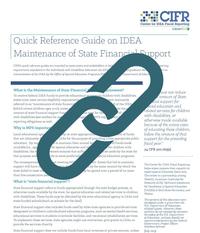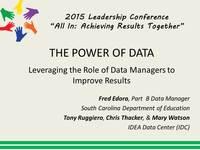Site Search
Results 36 - 42 of 608
Format: Guides, Papers, and Reports
Quick Reference Guide on IDEA Maintenance of State Financial SupportDeveloped by CIFR, this two-page quick reference guide assists states and stakeholders in better understanding the basics of the MFS requirements stipulated in the IDEA. The guide describes the requirements, types of financial support states may make available, reporting obligations, and MFS waivers. It concludes with questions for states to consider and additional resources.
Format: Checklists, Crosswalks, and Rubrics
New IDEA MOE Regulations CrosswalkWith new MOE regulations going into effect on July 1, 2015, CIFR staff developed this document to show differences between the new regulations and the ones that have been in place since 2006.
Format: Presentations
The Role of IDEA Data Managers in LA/SEA Data Governance ProgramsData governance is a critical function for organizing and exerting proper influence over data management decisions. During the last several years, many LAs and SEAs have defined and adopted data governance programs. This session explored the role of IDEA data managers as data stewards in SEA data governance programs.
Format: Presentations
Now You See It: Seeing the Story in the DataThis session demonstrated creative ways data are being displayed to tell the story of IDEA and other data. Participants heard from states that are displaying data in ways that tell data stories and convey meaning to stakeholders and the public. Participants also saw ways to access various online federal education data. This session offered participants online resources and websites about effective data displays.
Format: Presentations
Equity, Inclusion, and Opportunity in Special EducationIn this webinar, which IDC staff presented for the University of Tennessee’s Boling Center for Developmental Disabilities, we first discuss the requirements in the IDEA related to disproportionality, describe methods for calculating disproportionality, and present data, both at the national level and for the state of Tennessee. The second part of the webinar introduces a research-based guidance document and self-assessment rubric designed to help schools and districts identify the root causes of "success gaps."
Format: Presentations
Identified Significant Disproportionality – Now What?After a State determines that a district has significant disproportionality, what are the next steps? Presenters and session participants discussed how states can identify technical assistance and available tools and resources to help LEAs identify root causes and implement action steps, including CEIS, to make substantive improvement.
Format: Presentations
The Power of Data: Leveraging the Role of Data Managers to improve ResultsThis session examined the strategic role data play in state agency decision making by exploring how data managers can more effectively use their role to promote public reporting, data awareness, data utilization, and systems change. Presenters paid particular attention to data governance, cross-department information sharing, timely data access, distribution, usability, and analysis, along with examples of best practice from practitioners in the field to ultimately improve student results.








